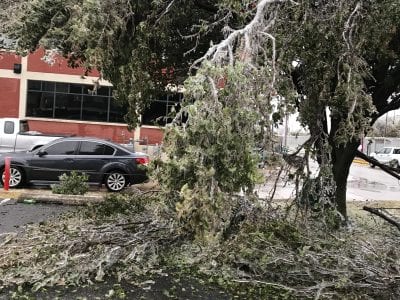Are You Covered for a Winter Storm?
| By Krush Digital | 0 Comments

Winter Storm and Insurance
Many Oklahomans are cleaning up after the ice storms that swept through the state this week. But the clean-up is just part of the recovery effort. Navigating through the insurance claim process can be confusing and stressful. Now is the time to find out if your insurance policy and deductible best suits your needs.
Here are some commonly asked questions and the answers about home insurance coverage about this week’s storm and fallen trees. Please note the answer depends on your policy.
-
Will my insurance company pay to repair a roof damaged by the weight of ice or snow?
A collapse of a structure, such as your roof, due to the weight of ice or snow is often covered under a standard home insurance policy. However, some nonstandard policies, such as the HO2 form do not have coverage for the weight of ice and snow, and therefore, that risk would not be covered. The best thing to do is review your policy. Check to see what the policy states about covered perils. If it does not list the weight of ice and snow, then you do not have the coverage. Contact your insurance agent about purchasing a policy that would protect you from the weight of ice and snow.
-
A tree fell and landed in my yard. Will my insurance pay to remove it?
Typically, fallen trees are not covered unless it has fallen on your house or driveway. It will cover damage to your fence, roof, troughs, windows, porches and outbuildings. However, debris removal from your yard, in the absence of physical property damage, will generally be at your own expense.
-
My neighbor’s tree fell into my house yard and damaged my garage. Will my neighbor’s insurance pay for the damage and removal?
Only if your neighbor was negligent in this situation would their policy pay for your damage. If the damage is from an act of nature, then the neighbor is not liable, and you would need to file the loss with your insurance company or agent.
-
An ice storm caused my tree to fall on my car. Will my homeowner’s policy pay for the damage to my car and to remove the tree?
No. The homeowner’s policy pays for damage to the home and for liability when an insured is negligent. In this case, you would need to file the claim with your auto insurance carrier to have the vehicle repaired. If you only had liability, then you would be out of pocket for repairs or replacing the vehicle. If a neighbor was cutting down a tree and it hit your car, or they did not remove a dead tree after
being told to do so in writing by neighbors or the city, then your car would be covered under their policy because of their negligence. -
I am unable to live in my home due to damage or power outage. Will I receive additional living expenses?
If the source of the power outage is on your property, such as incoming power lines that become disconnected from your home, homeowners insurance generally covers additional living expenses. This includes reasonable lodging and food expenses. Keep the receipts to share with your adjuster. If you are without power due to a widespread power outage occurring away from your property, homeowners insurance generally does not cover additional living expenses.
-
The power outage from the storm has caused food in my refrigerator to go bad. Does my policy pay for food spoilage in this situation?
As long as the power outage was caused on your premises, the homeowner’s insurance generally pays for food spoilage. If the outage occurred away from the policyholder’s property, there could be a coverage issue. Again, talk with your agent to verify how this scenario would affect you. Finally, take pictures and keep a detailed list of the food items you had to throw away and share it with your adjuster. This will assist the adjuster in assessing the loss.
When it comes to effectively submitting home insurance claims, insurance experts say the most important thing is to immediately document the damage to your property. Take photographs of the damage and make a list of everything you want to show the adjuster.
Then contact your insurance provider to get clarification and details regarding your policy. Understanding your coverage and deductible amount will allow you to make an informed decision on whether you want to file a claim. If your damages do not exceed your deductible, realize the repairs will be an out-of-pocket expense. Talk with your agent about other endorsements you can add to your policy to better protect your
property.
If you have questions about other insurance issues, contact the Oklahoma Insurance Department at 1-800-522-0071 or visit our website at www.oid.ok.gov.
